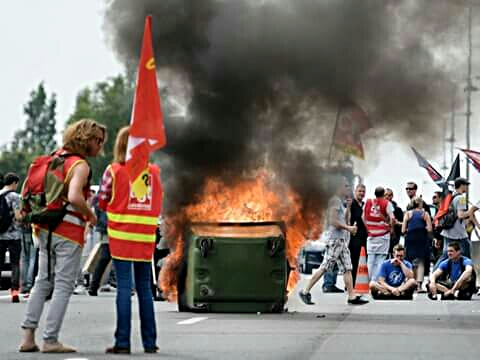
Mass protests grip France as Hollande pushes ‘labour reform’
France has erupted in large-scale protests since the Nuit debout movement began in March. Workers and students oppose labour reforms initiated by President François Hollande. The government’s proposed measures would weaken hard-won labour protections. They would intensify pressure on France’s working people.
Demonstrations spread across the country’s major cities. Paris, Nantes, Lyon, Marseille, and Toulouse all witnessed significant mobilisation. The scale and intensity recalled Paris 1968. Many observers drew direct comparisons to that historic labour uprising. The French protests thus reconnected contemporary workers with past struggles.
The French protests reflected deep anxiety about economic security. Unemployment had climbed steadily. Youth without qualifications faced particularly bleak prospects. The government claimed reforms would create jobs. Workers disputed this assertion vigorously.
Government stands firm amid French protests
Prime Minister Manuel Valls rejected all calls for retreat. The government would proceed with reforms, he insisted firmly. These measures followed guidelines from international financial institutions. The World Bank, IMF, WTO, and European Central Bank shaped the policy direction.
Hollande’s Socialist Party remained divided on economic liberalisation. Right-wing figures within the party, including Hollande himself, embraced neo-liberal frameworks. A smaller faction opposed the liberalisation drive actively. However, their resistance remained largely rhetorical rather than organisational.
Hollande had already demonstrated an unwavering commitment to corporate interests. His government provided €4 billion in tax cuts to large businesses. The president apparently believed this loyalty to capital would secure re-election next year. Hollande gambled that workers would accept hardship if business thrived.
Workers mobilise against labour market changes
The largest French labour union, the CGT, directly challenged government policy. The proposed reforms alarmed labour leaders nationwide. Railway workers initiated strike action. Students joined in agitation. Factory workers rallied persistently on the streets.
The government claimed the reforms would benefit workers fundamentally. Higher employment would follow, officials argued repeatedly. The measures simply made hiring easier. They would unlock job creation in a stagnant economy, the argument went.
Union organisers rejected this reasoning entirely. France faced 24 per cent unemployment overall. Youth unemployment without qualifications reached 46 per cent. The unions accused the government of easing dismissals rather than facilitating employment. Precedent from elsewhere supported their concerns.
Similar labour market liberalisations had failed to create jobs elsewhere. Semi-colonial nations across Asia, Africa, and Latin America had implemented comparable measures. The result: workers laboured under precarious conditions for minimal wages. Labour protections disappeared entirely. Social security provisions eroded substantially. French workers faced transformation into something resembling modern Britain.
Hollande’s neo-liberal direction deepens worker concerns
The proposed reforms targeted core labour market protections directly. Hiring and firing would become easier. Regulations constraining employer power would vanish. These changes threatened existing security for working people fundamentally.
The timing created particular hardship. France struggled with high inflation already. Living costs had risen significantly for workers. They needed wage protection now. Instead, Hollande offered neither protection nor adequate income.
The Socialist Party insisted the reforms served worker interests fundamentally. This claim rang hollow among working people. The repeated assertions amounted to propaganda. The French protests expressed genuine hatred for these liberalisation policies. Workers rejected the globalisation agenda driving Hollande’s strategy.
Mass mobilisation continues despite government intransigence
Workers sustained their resistance across multiple fronts. The CGT and smaller working-class organisations coordinated street action continuously. They organised strike campaigns relentlessly. The movement persisted despite the government’s refusal to negotiate. The intensity suggested deep commitment among participants.
Some observers noted concerning patterns within the anti-Hollande opposition. Certain opportunist figures sought to channel anger toward electoral outcomes. References to Syriza in Greece and Podemos in Spain appeared frequently. Such comparisons risked diluting working-class militancy into conventional political competition.
The French protests nevertheless reflected genuine grievance deeply rooted in daily experience. Workers understood clearly that neo-liberal economic policies would damage their material conditions. This class consciousness remained significant even if leadership remained contested.
Broader struggle for working-class power
France’s labour movement had achieved historic victories during the twentieth century. French workers had led international efforts against monopoly capital and finance globally. The current struggle continued this essential tradition.
The European working class now resisted anti-worker policies across multiple nations. Different governments pursued similar agendas regardless of nominal political identity. The vehement opposition from workers demonstrated remarkable class clarity. It showed how workers from wealthy nations recognised their fundamental interests aligned with workers elsewhere.
Yet risks remained significant. Leadership questions would shape the struggle’s eventual trajectory. Revolutionary forces had not yet secured influence within the movement. Without such direction, workers risked experiencing betrayal from opportunist leaders. Those claiming to represent working interests, including Hollande himself, would attempt to manage and constrain the struggle.
The coming months would test French working-class militancy severely. Whether the movement could sustain pressure whilst resisting opportunist cooption remained genuinely uncertain. The stakes extended far beyond France itself. European labour movements watched developments carefully. The outcome would influence working-class struggles across the continent for years ahead.
An avid reader and a merciless political analyst. When not writing then either reading something, debating something or sipping espresso with a dash of cream. Street photographer. Tweets as @la_muckraker

